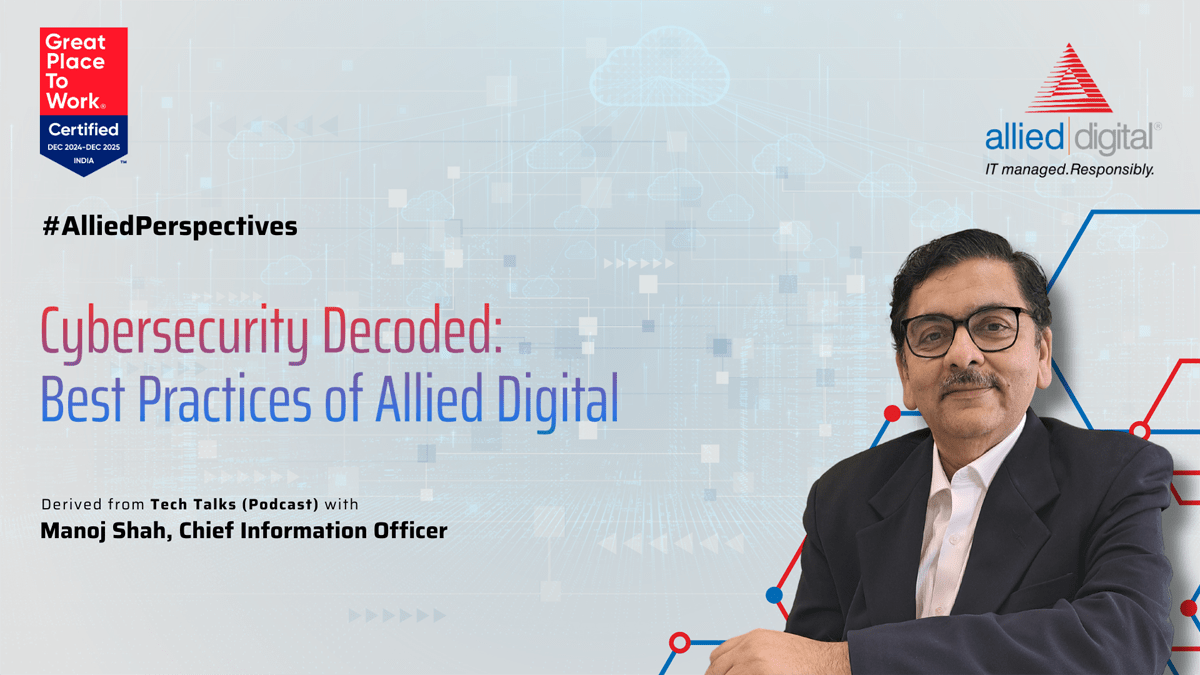Cybersecurity Decoded: Best Practices of Allied Digital

This blog is derived from a byte from Tech Talks by Allied Digital.
Cybersecurity Decoded: Best Practices of Allied Digital
Allied Digital employs a comprehensive cybersecurity strategy that integrates globally recognized frameworks and best practices to effectively manage and mitigate cyber threats. Here's an elaboration on the key frameworks and practices they adopt:
NIST Cybersecurity Framework (CSF)
Allied Digital utilizes the NIST Cybersecurity Framework (CSF) to systematically manage cybersecurity risks. This framework is structured around five core functions:
- Identify: Understanding and managing cybersecurity risks to systems, assets, data, and capabilities.
- Protect: Implementing safeguards to ensure delivery of critical infrastructure services.
- Detect: Developing activities to identify the occurrence of cybersecurity events.
- Respond: Taking action regarding detected cybersecurity incidents.
- Recover: Maintaining plans for resilience and restoring capabilities impaired by cybersecurity incidents.
This structured approach enables Allied Digital to proactively address potential threats and enhance their cybersecurity posture.
SOC 2 Compliance
As a service organization, Allied Digital adheres to the SOC 2 framework, which focuses on five Trust Services Criteria:
- Security: Protecting information and systems against unauthorized access.
- Availability: Ensuring systems are available for operation and use.
- Processing Integrity: Delivering system processing that is complete, valid, accurate, timely, and authorized.
- Confidentiality: Protecting information designated as confidential.
- Privacy: Ensuring personal information is collected, used, retained, disclosed, and disposed of in conformity with the commitments in the entity’s privacy notice.
Undergoing regular SOC 2 audits demonstrates Allied Digital's commitment to maintaining high standards in data security and privacy.
ISO/IEC 27001 Certification
Allied Digital has achieved ISO/IEC 27001 certification, an international standard for Information Security Management Systems (ISMS). This certification involves:
Establishing a systematic approach to managing sensitive company information.
- Conducting regular risk assessments and implementing appropriate controls.
- Ensuring continuous improvement through periodic audits and reviews.
By aligning with ISO/IEC 27001, Allied Digital ensures that its information security practices meet international best practices.
Continuous Risk Management and Auditing
Beyond these frameworks, Allied Digital emphasizes:
- Regular Audits: Conducting internal and external audits to assess the effectiveness of security controls.
- Risk Assessments: Identifying and evaluating potential risks to information assets.
- Employee Awareness Programs: Educating staff on cybersecurity best practices and emerging threats.
- These practices foster a culture of security awareness and proactive risk management within the organization.
Conclusion
Allied Digital's integration of NIST CSF, SOC 2, and ISO/IEC 27001 frameworks, coupled with continuous risk management and employee training, exemplifies a robust approach to cybersecurity. This multifaceted strategy ensures resilience against cyber threats and aligns with global standards for information security.
